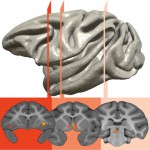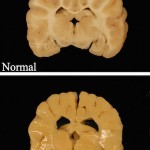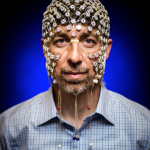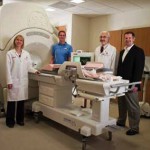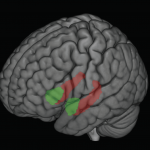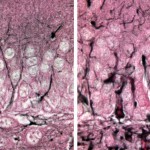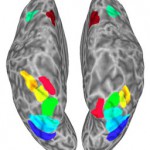Tag Brain
Researchers pinpoint where the brain unites our eyes’ double vision
If you have two working eyes, you are live streaming two images of the world into your brain. Your brain combines the two to produce a view of the world that appears as though you had a single eye - like the Cyclops from Greek mythology.
UW-Madison collaboration promotes well-being in the workplace
Standing in front of a room of business professionals, Jill McDermott shares a number: two quadrillion - the number of megabytes of information broadcast daily. She pauses to let the audience reflect on how this inundation of information contributes to distractions in the workplace that can chip away at a person's well-being and ability to respond to daily challenges, whether it's giving projects the attention they deserve or shaking off a setback or conflict with a colleague.
Fragile X proteins involved in proper neuron development
Fragile X syndrome is the most common inherited intellectual disability and the greatest single genetic contributor to autism. Unlocking the mechanisms behind fragile X could make important revelations about the brain.
Rare neurological disease shines light on health of essential nerve cells
Ian Duncan is a Scotsman with the iron discipline and stamina of a competitive marathoner, triathlete and cross-country skier. As a neuroscientist at the School of Veterinary Medicine at the University of Wisconsin–Madison, he's applied his tenacity to a rare genetic disorder.
Imagination, reality flow in opposite directions in the brain
As real as that daydream may seem, its path through your brain runs opposite reality. Aiming to discern discrete neural circuits, researchers at the University of Wisconsin–Madison have tracked electrical activity in the brains of people who alternately imagined scenes or watched videos.
See-through sensors open new window into the brain
Developing invisible implantable medical sensor arrays, a team of University of Wisconsin–Madison engineers has overcome a major technological hurdle in researchers’ efforts to understand the brain. The team described its technology, which has applications in fields ranging from neuroscience to cardiac care and even contact lenses, in the Oct. 20 issue of the online journal Nature Communications.
Yogic breathing shows promise in reducing symptoms of post-traumatic stress disorder
One of the greatest casualties of war is its lasting effect on the minds of soldiers. This presents a daunting public health problem: More than 20 percent of veterans returning from the wars in Iraq and Afghanistan have post-traumatic stress disorder, according to a 2012 report by RAND Corp.
University spinoff aims to hit the mark precisely with brain-scanning tool
As brain surgeons test new procedures and drugs to treat conditions ranging from psychiatric disorders to brain cancer, accuracy is becoming an ever-greater issue.
UW, Madison schools team up to train mindfulness muscles
Mindfulness practice in the classroom may be one way to help students improve their academic performance, nurture their emotional well-being and bolster their behavior.
Early life stress can leave lasting impacts on the brain
For children, stress can go a long way. A little bit provides a platform for learning, adapting and coping. But a lot of it - chronic, toxic stress like poverty, neglect and physical abuse - can have lasting negative impacts.
Study helps unravel the tangled origin of ALS
By studying nerve cells that originated in patients with a severe neurological disease, a University of Wisconsin–Madison researcher has pinpointed an error in protein formation that could be the root of amyotrophic lateral sclerosis.
Even or odd: no easy feat for the mind
Even scientists are fond of thinking of the human brain as a computer, following sets of rules to communicate, make decisions and find a meal.
Poverty influences children’s early brain development
Poverty may have direct implications for important, early steps in the development of the brain, saddling children of low-income families with slower rates of growth in two key brain structures, according to researchers from the University of Wisconsin–Madison.
Estrogen: Not just produced by the ovaries
A University of Wisconsin–Madison research team reports today that the brain can produce and release estrogen - a discovery that may lead to a better understanding of hormonal changes observed from before birth throughout the entire aging process.
Rare disease yields clues about broader brain pathology
Alexander disease is a devastating brain disease that almost nobody has heard of — unless someone in the family is afflicted with it. Alexander disease strikes young or old, and in children destroys white matter in the front of the brain. Many patients, especially those with early onset, have significant intellectual disabilities.
A shot of anxiety and the world stinks
Researchers using powerful new brain imaging technologies are revealing how anxiety or stress can rewire the brain, linking centers of emotion and olfactory processing, to make typically benign smells malodorous.
Brain pathways tie together mental maps
To find its way in the world, your brain has to decipher a set of directions muddled by different points of view.
Grandparents gather for support at Waisman Center
You're not alone. It's a simple message but one that can provide great comfort. That is just part of what those who gather at the Waisman Center as part of the Grandparents' Network take with them following each meeting.
Ned Kalin – revealing disorders of the brain
Dr. Ned Kalin, chair of the Department of Psychiatry, is an accomplished biological psychiatrist whose research focuses on anxiety. Through imaging studies and understanding the genetic and environmental components of mental illness, his lab is working toward discoveries that can form the basis of early interventions to treat children who are at risk of developing long-term anxiety and related psychiatric disorders.


